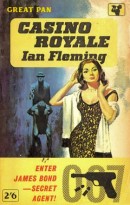 I just posted about Ben Macintyre’s Operation Mincemeat on The Shelf. It’s been getting enthusiastic reviews, and I’m eager to read it. Via Clive Crook, I also found that Macintyre recently spoke to The Browser’s Five Books about his favorite books about spies and spying. Of Ian Fleming’s works, he chose Casino Royale. Here’s why:
I just posted about Ben Macintyre’s Operation Mincemeat on The Shelf. It’s been getting enthusiastic reviews, and I’m eager to read it. Via Clive Crook, I also found that Macintyre recently spoke to The Browser’s Five Books about his favorite books about spies and spying. Of Ian Fleming’s works, he chose Casino Royale. Here’s why:
I think it’s the best of them, and it’s wonderful because it reveals what I think is the essential Bond. The film Bond is very, very different from the character that Ian Fleming invented. The real character was unknowable. There’s something rather creepy and peculiar about the original James Bond and you get that in buckets in Casino Royale. . . .
It was 1953 and it was very remarkable for the time, because Bond was so cruel. He’s horribly tortured in the book and there are some very grim moments in it. But I also think it’s Fleming’s best writing. It wings along—it’s very hard to stop reading. It’s also brilliant at place. He manages to summon up the smoky stench of a casino in a way that no one else has ever managed to do. And it was incredibly glamorous. Here was Britain emerging from the depredations of war in a time of great austerity and here was a character on an apparently limitless expense account, having guilt-free sex and ordering dry martinis in the most glamorous places. It was a wonderful bit of escapism for the time. It’s a tour de force and by far his best novel.
He also explained why he thinks the British are better at writing about spies—and at spying itself:
Now all these books are about British spies. Is there an equivalent catalogue of great American spy books?
I don’t think the Americans do it nearly as well as we do. Yes, there are lots, but they’re all fairly derivative and I don’t think they have the same psychological depth. The British are particularly good not just at spying but at writing about spying. I think it’s to do with the natural theatricality of the British character and also a public-school system that for many generations encouraged a covering-up of what you really felt and thought. Hidden homosexuality, hidden feelings about loneliness. The British class system encouraged a certain amount of subterfuge.

